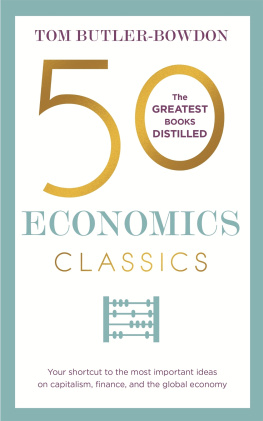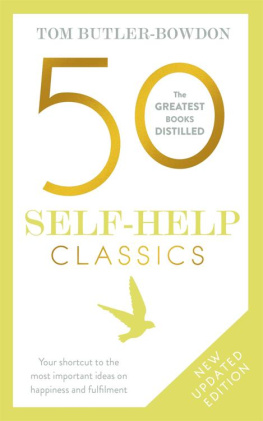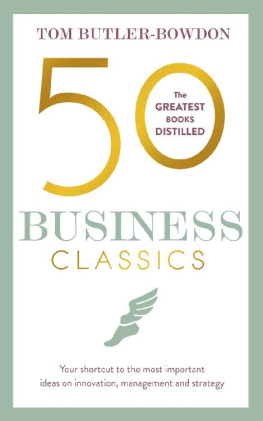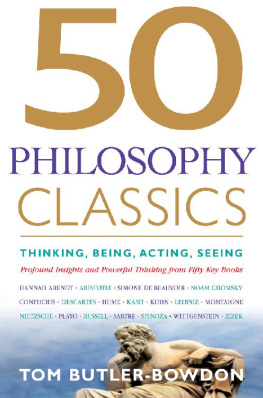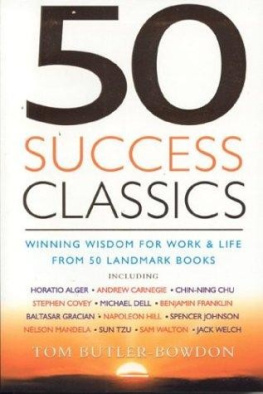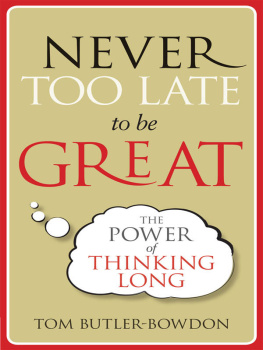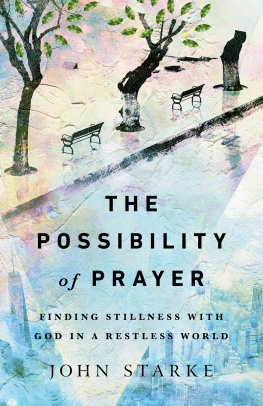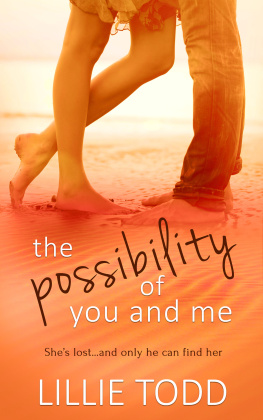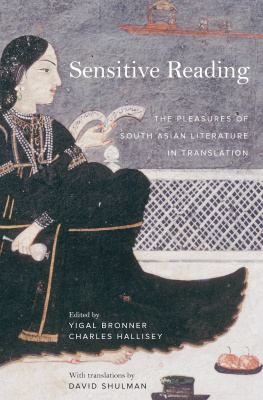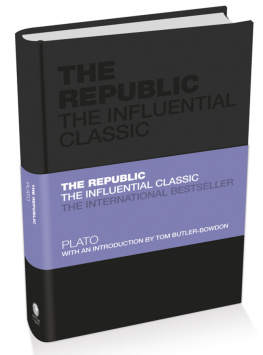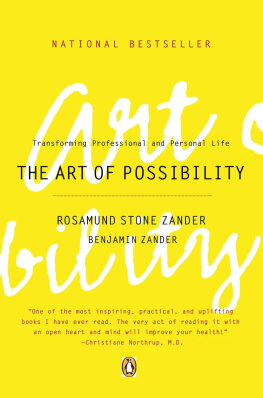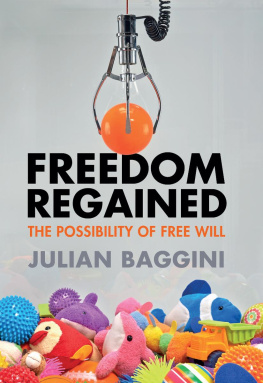The Literature
of
Possibility
Tom Butler-Bowdon
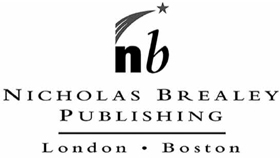
This Introduction to the Collection of the 50 Classics Series
first published by
Nicholas Brealey Publishing in 2013
35 Spafield Street | 20 Park Plaza |
Clerkenwell, London | Boston |
EC1R 4QB, UK | MA 02116, USA |
Tel: +44 (0)20 7239 0360 | Tel: (888) BREALEY |
Fax: +44 (0)20 7239 0370 | Fax: (617) 523 3708 |
www.nicholasbrealey.com
www.butler-bowdon.com
Tom Butler-Bowdon 2013
The right of Tom Butler-Bowdon to be identified as the author of this work has been asserted in accordance with the Copyright, Designs and Patents Act 1988.
Introduction eISBN 978-1-85788-996-3
Collection eISBN 978-1-85788-935-2
50 Philosophy Classics Tom Butler-Bowdon 2013
50 Prosperity Classics Tom Butler-Bowdon 2008
50 Psychology Classics Tom Butler-Bowdon 2007
50 Self-Help Classics Tom Butler-Bowdon 2003
50 Spiritual Classics Tom Butler-Bowdon 2005
50 Success Classics Tom Butler-Bowdon 2004
British Library Cataloguing in Publication Data
A catalogue record for this book is available from the
British Library.
All rights reserved. No part of this publication may be reproduced, stored in a retrieval system, or transmitted, in any form or by any means, electronic, mechanical, photocopying, recording and/or otherwise without the prior written permission of the publishers. This book may not be lent, resold, hired out or otherwise disposed of by way of trade in any form, binding or cover other than that in which it is published, without the prior consent of the publishers.
Contents
50 Philosophy Classics: Thinking, Being, Acting, Seeing
Profound insights and powerful thinking from 50 key books
50 Prosperity Classics: Attract It, Create It, Manage It, Share It
Wisdom from the best books on wealth creation and abundance
50 Psychology Classics: Who We Are, How We Think, What We Do
Insight and inspiration from 50 key books
50 Self-Help Classics: 50 Inspirational Books to Transform Your Life
From timeless sages to contemporary gurus
50 Spiritual Classics: Timeless Wisdom from 50 Great Books
Inner discovery, enlightenment and purpose
50 Success Classics: Winning Wisdom for Work and Life
From 50 landmark books
The Literature of
Possibility
What is the literature of possibility? For over 2,000 years, philosophers have been interested in what makes for the good life in terms of the ability to provide for oneself and ones family, enjoy the pleasures of culture and nature, participate in political life, and make some contribution to society. The literature of possibility is certainly about achieving the good life, but it goes a step beyond this to ask about the full range of possibilities carried within a person. Many people achieve a good lifestyle but still wonder: Is there something more I could do?
A good number of the books covered in this series call for us to have a life purpose, goal, or project that will make the most of our talents and dispositions. Each of us is not just a consumer, but a being with unique promise that is bursting to be expressed. If there is a single thread running through the books I have written about, it is their concern with the freedom, power, or advance of the individual.
My first book, 50 Self-Help Classics, shows the deep heritage of this field. Samuel Smiles wrote the seminal Self-Help in 1859, the same year Darwin published On the Origin of Species, yet the great writings it includes had previously had surprisingly little appraisal. The Introduction to my book states, A conventional view of self-help is that it deals with problems, but most of the self-help classics are about possibilities.
Defining self-help as a refusal to accept common unhappiness or quiet desperation as the lot of humankind, the books theme is that we can shape our world by changing our thoughts and habits of thinking. William James called this fact the greatest discovery of my generation, and psychologist Martin Seligman described it as one of the most significant findings in psychology in the last twenty years. Boethiuss ancient The Consolation of Philosophy and Viktor Frankls twentieth-century classic Mans Search for Meaning both showed that no matter how adverse the situation, there is always room to decide on its meaning for us. To decide consciously what we will think, rather than merely expressing our genes or environment, or allowing fate to determine our path, is the essence of self-help.
When Samuel Smiles penned Self-Help, he worried that it would be seen as a tribute to selfishness. In fact, it was more in the tradition of Ralph Waldo Emersons Self-Reliance, showing how strength and power lay in individual agency. Smiles had originally been a political reformer, but realized that the real revolutions happened inside peoples heads. He took his centurys greatest idea, progress, and applied it to personal life. Indeed, self-help is not about some fantasy of the ego, but about devoting oneself to a goal or way of being that can make a difference to the world. Engaging in this larger effort calls on all our resources and strengths, and so changes us in the process.
If 50 Self-Help Classics is about developing a sense of purpose, the second book in this series, 50 Success Classics, focuses on actual achievement. From the moment we are born we want to do more, get more, be more, it suggests in the first few lines; the desire to succeed is fundamental to human existence.
The book posits better thinking or a larger perspective as the key to personal advance, highlighting powerful titles such as The Magic of Thinking Big and The Magic of Believing. In reaching high we need models, and the book also covers biographies of inspiring people including Abraham Lincoln, Eleanor Roosevelt, Ernest Shackleton, Nelson Mandela, and Warren Buffett.
As Timothy Gallwey pointed out in The Inner Game of Tennis, there is a difference between winning and success. Winning is simply overcoming obstacles to achieve a goal, but the victory is only as great as the value of the goal reached. Genuine success is about the desire for enduring achievements that will enrich your life and the lives of others. The desire to win is about the contestant, but real success involves a quest that takes us beyond the self.
50 Success Classics lists some characteristics of successful people, including optimism, a definite aim, willingness to work, discipline, development of intuition, and prolific reading. The person who seeks growth, Dale Carnegie said, must soak and tan his mind in the vats of literature. By continually working on ourselves, success moves from being a mere hope to becoming a probability.
Perhaps the most important success strategy, and yet the simplest, is to choose a path that expresses our personality and abilities in the fullest way. The world provides endless possibilities for making it more efficient, more humane, more beautiful. It is up to us to find a niche that achieves one of these aims.
The third book in the series, 50 Spiritual Classics, began with the assumption that material things cannot satisfy us for long. Not even emotional security or great knowledge will sustain us we are made to seek answers to the larger questions. The spiritual literature is a treasure trove of collective wisdom, at least equal to the great libraries of science, philosophy, poetry or fiction, I wrote.


